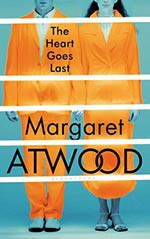
![]() Badseedgirl
Badseedgirl
11/28/2016
![]()
While reading Margaret Atwood's novel The Heart Goes Last I was reminded of so many other great novels. At times, I felt like I was reading the story of George Orwell's 1984 at the beginning of political upheaval. Sometimes I felt like I was reading Atwood's Handmaid's Tale with a gender twist. Phillip Jose Farmer wrote an entire series about a society where seven people share one life called Dayworld. But in the end I was not sure how much I enjoyed the actual story.
All the characters in the novel were extreme, both the male and females. I found the female protagonist, Charmaine, to be one of the most annoying characters I have ever read. She could be the poster child for female passive aggression, and a throw rug all at the same time. On the opposite spectrum is our other female "protagonist" Jocelyn. She is a ball-buster and a rapist, her attitude is that of a stereotypical male from the 50's. She wears the pants in all her relationships, and the one man who does try to get one over on her, pays a heavy price in the end.
On the male side, the characters are well written but weak of spirit. John the main male protagonist and Max the other male protagonist have very little regard for the women in their lives. They are treated more like lovable but tedious pet. Maybe a hamster, nice to get out and play with when they feel like it, but in general kept in a cage with minimal attention.
Although set in semi-distant future, the characters inhabit a closed society that is a mirror of the stereotypical 50's suburb. This Ms. Atwood's not so subtle stab at the American ideal of suburban life. Unfortunately, this dig feels dated as the societal norm that she is railing again is hardly a norm anymore. In 2010 over 44% of the households in the US were single parents with children, one person, or other non-families (http://www.prb.org/Publications/Repor...). Although not a majority of the households it is a larger percentage than I think Ms. Atwood realizes. By writing this satire, Ms. Atwood is perpetuating the myth of the American white picket fence society. And maybe that was the problem I had with this book. Margaret Atwood wrote this novel in 2015, I found the population data on the internet in less than 5 minutes. I think Ms. Atwood might have done the same.
The ending of this story reminded me so much of The Handmaid's Tale. Not because of the story so much as the fact that both books leave the reader with so many unanswered questions. Charmaine is left with a choice between security and freedom, but we the reader are left to our own imagination as to what she would choose. I know the choice I would make, but would Charmaine do the same.
Like many readers, The Handmaid's Tale was the first Atwood book I ever read. It came to me at the right time when I was a budding feminist. I was ready for the message she was delivering. This first reading had such an effect on me that it has colored my attitude towards Margaret Atwood's writing. But if I was being really, brutally honest with myself, none of her books have ever come close to the feelings that first book gave me.
Despite all these complaints, The Heart Goes Last was not a bad book. At times the story was funny, and I found myself sniggering behind my hand, reminding me of the time when as children my sister and I found my Aunts copy of the The Joy of Sex. It was the 1975 version with all the smelling of the hairy, undeodorized armpits. But I'm not sure if that is enough to give The Heart Goes Last more than 2 1/2 stars (The 1975 The Joy of Sex is definitely worth at least 4 stars!)
2.5 of 5 stars